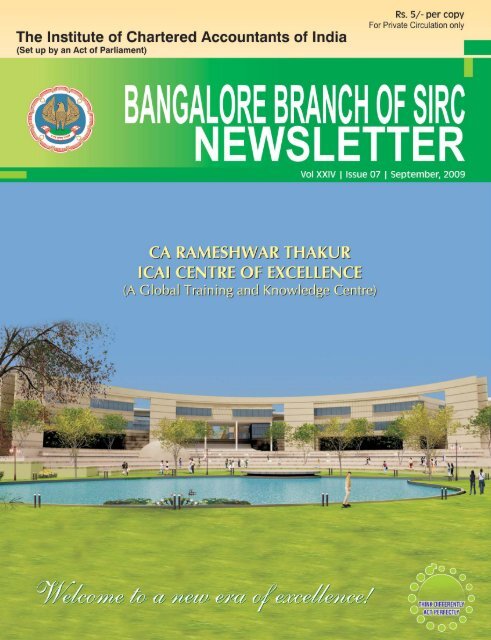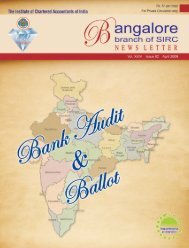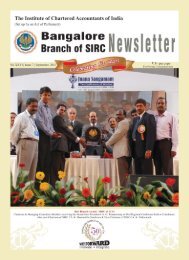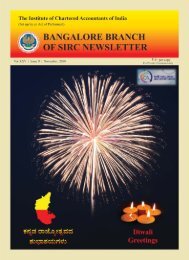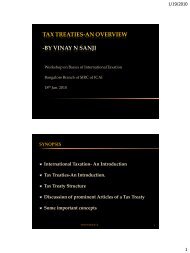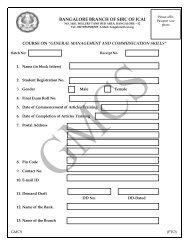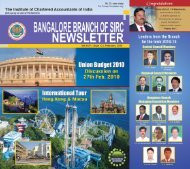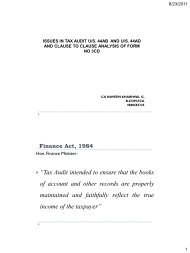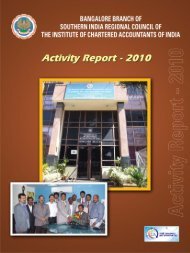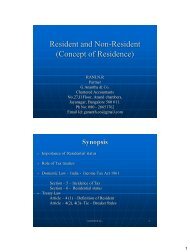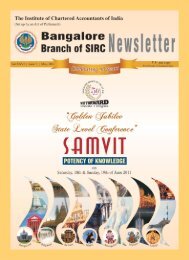Blore Br_Sept_09_Newsletter_email.pmd - Bangalore Branch of SIRC
Blore Br_Sept_09_Newsletter_email.pmd - Bangalore Branch of SIRC
Blore Br_Sept_09_Newsletter_email.pmd - Bangalore Branch of SIRC
- No tags were found...
You also want an ePaper? Increase the reach of your titles
YUMPU automatically turns print PDFs into web optimized ePapers that Google loves.
Think Differently Act Perfectly1<strong>Sept</strong>ember20<strong>09</strong>
<strong>Bangalore</strong> <strong>Br</strong>anch <strong>of</strong> <strong>SIRC</strong><strong>of</strong> the Institute <strong>of</strong> Chartered Accountants <strong>of</strong> India<strong>Sept</strong>ember20<strong>09</strong>2
Think Differently Act PerfectlyPROGRAMMES - A BIRDS EYE VIEW - <strong>Sept</strong>ember 20<strong>09</strong>Date/Day Topic /Speaker Venue/Time CPE Credit01/<strong>09</strong>/20<strong>09</strong> AS-2: Valuation <strong>of</strong> InventoryAS-12: <strong>Br</strong>anch PremisesTuesday Accounting for Government Grants 6.00pm to 8.00pmCA. R. Kesavadas03/<strong>09</strong>/20<strong>09</strong> AS-20: Earnings Per ShareAS-18: <strong>Br</strong>anch PremisesThursday Related Party Disclosures 6.00pm to 8.00pmCA. S. Ramanujam07/<strong>09</strong>/20<strong>09</strong> GST - Way forward Preparedness, Issues and Concerns Hotel Fortune Select JP CosmosMonday Sri. R. Sekar, Commissioner <strong>of</strong> Customs, Pune 6.00pm to 8.00pm08/<strong>09</strong>/20<strong>09</strong> AS-14: Accounting for Amalgamations <strong>Br</strong>anch PremisesTuesday CA. Charan S Gupta 6.00pm to 8.00pm10/<strong>09</strong>/20<strong>09</strong> Recent Changes in Service Tax and Sri Bhagawan Mahaveer JainThursday Service Tax Returns College AuditoriumCA. Srikantha Rao. TNext to <strong>Bangalore</strong> Stock ExchangeDelegate Fee: Rs. 200/- 5.00pm to 8.00pm12/<strong>09</strong>/20<strong>09</strong> Business Valuation <strong>Br</strong>anch PremisesSaturday CA. Aparna Ram Mohan 9.00am to 1.00pmDelegate Fee: Rs. 250/-15/<strong>09</strong>/20<strong>09</strong> AS-17: Segment Reporting <strong>Br</strong>anch PremisesTuesday AS-24: Discontinuing Operations 6.00pm to 8.00pmCA. Y. J. Raghunatha Reddy17/<strong>09</strong>/20<strong>09</strong> Schedule VI <strong>of</strong> The Companies Act Vs. <strong>Br</strong>anch PremisesThursday Accounting Standards – Way Forward 6.00pm to 8.00pmCA. S. Krishnaswamy06/10/20<strong>09</strong> Levy and Clarification under Service Tax-Law & Practical Issues <strong>Br</strong>anch PremisesTuesday CA. T.R. Rajesh Kumar 6.00pm to 8.00pm08/10/20<strong>09</strong> Valuation under Service Tax Law Practical Issues <strong>Br</strong>anch PremisesThursday CA. Chidanand Urs 6.00pm to 8.00pmNote :High Tea for Programmes at <strong>Br</strong>anch Premises at 5.30 pm.2 Hrs.2 Hrs.2 Hrs.2 Hrs.3 Hrs.3 Hrs.2 Hrs.2 Hrs.2 Hrs.2 Hrs.Important Dates to remember during the month <strong>of</strong> <strong>Sept</strong>ember 20<strong>09</strong>5-Sep-<strong>09</strong> - Payment <strong>of</strong> Central Excise Duty for the month <strong>of</strong> August 20<strong>09</strong>.- Payment <strong>of</strong> Service Tax for the month <strong>of</strong> August 20<strong>09</strong>. (in case <strong>of</strong> persons other than individual, proprietor &partnership firms)7-Sep-<strong>09</strong> - Payment <strong>of</strong> TDS deducted & TCS Collected, in the month <strong>of</strong> August 20<strong>09</strong>.10-Sep-<strong>09</strong> - Filing <strong>of</strong> monthy returns <strong>of</strong> Central Excise for the month <strong>of</strong> August 20<strong>09</strong>.15-Sep-<strong>09</strong> - Payment <strong>of</strong> Second Installment <strong>of</strong> Advance Tax in case <strong>of</strong> Companies- Payment <strong>of</strong> First Installment <strong>of</strong> Advance Tax in case <strong>of</strong> Non-corporate assessees- Filing <strong>of</strong> VAT 120 under KVAT Laws for the month <strong>of</strong> August 20<strong>09</strong>.- Payment <strong>of</strong> Provident Fund for the month <strong>of</strong> August 20<strong>09</strong>.20-Sep-<strong>09</strong> - Filing <strong>of</strong> VAT 100 under KVAT Laws for the month <strong>of</strong> August 20<strong>09</strong>.- Payment <strong>of</strong> Pr<strong>of</strong>essional Tax for the month <strong>of</strong> August, 20<strong>09</strong>.21-Sep-<strong>09</strong> - Payment <strong>of</strong> Employee State Insurance for the month <strong>of</strong> August 20<strong>09</strong>.25-Sep-<strong>09</strong> Filing <strong>of</strong> Monthly returns <strong>of</strong> Provident Fund for the month <strong>of</strong> August 20<strong>09</strong>.30-Sep-<strong>09</strong> - Filing <strong>of</strong> Income tax and FBT return(for Non-Corporate Audit Cases & Corporate assesses) for the A.Y. 20<strong>09</strong>-10.Advertisement Tariff for the <strong>Br</strong>anch <strong>Newsletter</strong>Colour full pageOutside back Rs. 20,000/-Inside front Rs. 15,000/-Inside back Rs. 15,000/-Inside Black & WhiteFull page Rs. 10,000/-Half page Rs. 6,000/-Quarter page Rs. 3,000/-Advt. material should reach us before 22nd <strong>of</strong> previous month.Editor : CA. Cotha S. SrinivasSub Editors : CA. S.N. RavindranathCA. T.R. Venkatesh BabuTotal Members <strong>of</strong> <strong>Bangalore</strong> <strong>Br</strong>anchas on 31-07-20<strong>09</strong> is 7,549.The <strong>Br</strong>anch does not accept any responsibility for the views expressed in Articles / Contributions / Advertisements published in this News Letter.Try Not to become a man <strong>of</strong> success but a man <strong>of</strong> value – Albert Einstein3<strong>Sept</strong>ember20<strong>09</strong>
<strong>Bangalore</strong> <strong>Br</strong>anch <strong>of</strong> <strong>SIRC</strong><strong>of</strong> the Institute <strong>of</strong> Chartered Accountants <strong>of</strong> India[20<strong>09</strong>] Taxman 181 FactSet Research Systems Inc., In re [AAR No. 787 <strong>of</strong> 2008, dt. 30-6-20<strong>09</strong>] (AAR-New Delhi)(BN – ix) Part 3 In this case, it was held that, the subscription fee received by the American company from thelicensee (user <strong>of</strong> database) does not fall within the scope <strong>of</strong> clause (v) <strong>of</strong> Explanation (2) to section 9(1) as royalty and the same is not taxable in India as royalty; it is liable to be taxed only as businessincome if at all it is found by the Revenue that an agency PE exists <strong>of</strong> the American Company.[20<strong>09</strong>] 181 Taxman 155 CIT vs. Raj Kumar (Delhi-HC)In this case, it was held that, the word ‘advance’ which appears inthe company <strong>of</strong> the word ‘loan’ could only mean such advance which carries with it an obligation<strong>of</strong> repayment. Trade advance which are in the nature <strong>of</strong> money transacted to give effect to acommercial transactions would not fall within the ambit <strong>of</strong> the provisions <strong>of</strong> section 2 (22) (e) <strong>of</strong>the Act dealing with deemed dividend. This interpretation would be in line with the rule <strong>of</strong> purposiveconstruction, noscitur a sociis, as applied by the Supreme Court in the case <strong>of</strong> LIC <strong>of</strong> India v. Retd.LIC Officers Association [2008] 3 SCC 321.[20<strong>09</strong>] 119 ITD 21 Aum Chemicals v. ACIT, Palghar (Mum - ITAT)In this case, assessee was a partnership firm,consisting <strong>of</strong> two partners. Assessee entered into an agreement, whereby business <strong>of</strong> firm wasconverted into company, namely, company ‘A’, and all assets and liabilities <strong>of</strong> firm were transferredto the said company. As per terms <strong>of</strong> agreement, shares <strong>of</strong> company ‘A’ were given to partners toextent <strong>of</strong> credit balances in their capital account. Assessing Officer opined that provisions <strong>of</strong>section 45 (4) were attracted and, therefore, he having calculated certain amount as ‘short-termcapital gain’ added same to assessee’s income.It was held by the Tribunal that, since, in instantcase, condition <strong>of</strong> distribution <strong>of</strong> capital assets on dissolution <strong>of</strong> firm was not satisfied, section 45(4) was not applicable. Even otherwise, Assessing Officer was not correct in computing capitalgain on amount <strong>of</strong> credit balances <strong>of</strong> partner’s capital accounts because after deducting cost <strong>of</strong>capital assets which was equal to their book value, calculation <strong>of</strong> capital gain came to nil.[20<strong>09</strong>] 119 ITD 49 ITO vs. Krishnonics Ltd. (Ahmedabad-ITAT)In this case, it was held that, the provisions <strong>of</strong>section 2 (22) (e) (ii) refers to the words “Substantial part <strong>of</strong> the Business” and nowhere refers tothe words “Substantial Income” which means that to find out as to whether a given case iscovered by the provisions <strong>of</strong> section 2 (22) (e) <strong>of</strong> the Act or not, income criteria from a particularsource is not relevant. However, these provisions take the case out <strong>of</strong> the scope <strong>of</strong> section 2(22)(e)(ii)<strong>of</strong> the Act only if substantial part <strong>of</strong> the business carried out by the payer company is found to bethat <strong>of</strong> lending <strong>of</strong> money and therefore, to find out substantial part <strong>of</strong> the business <strong>of</strong> the payercompany,one should consider the ‘objects’ and ‘deployment <strong>of</strong> the funds’ by the payer companybecause there can be cases where the company might have deployed more funds by way <strong>of</strong> loansduring the course <strong>of</strong> business <strong>of</strong> money lending at the fag end <strong>of</strong> the previous year and may nothave earned any interest or earned a small interest, but might have earned more dividend oninvestment having been made before the declaration <strong>of</strong> dividend on shares.[20<strong>09</strong>] 119 ITD 88 Ashwani Dhinga vs. ADIT (Delhi-ITAT)In this case, Assessee, an agriculturist, got compensationunder section 23 <strong>of</strong> Land Acquisition Act which comprised <strong>of</strong> three components, namely,compensation [u/s 23(1)], additional amount <strong>of</strong> compensation [u/s 23(1A)] and solatium [u/s 23(2)].Subsequently, in case <strong>of</strong> Union <strong>of</strong> India v. Birbal [Civil Revision No. 1598 <strong>of</strong> 1999, dated 17-8-2000], it was held by High Court that interest would also be payable on additional amountdetermined under section 23(1A). Thus, an amount fell to assessee’s share Rs. 6.53 lakhs wasworked out for each year under consideration. Assessee did not show above mentioned interestin returns. Assessing Officer issued notice under section 148 to assessee in response to which hefiled returns <strong>of</strong> income declaring income <strong>of</strong> Rs. 6,53,760 being taxable income and tax was paidunder section 140A. Assessing Officer completed assessment levying interest under sections 234A,234B and 234C.It was held that, when liability to be assessed at income <strong>of</strong> Rs. 6.53 lakhs had notbeen denied by assessee, consequences <strong>of</strong> same would be that assessee would be liable to file hisreturn <strong>of</strong> income for that year and all the obligations attached to that income would have also to becomplied with. Therefore, interest under sections 234A, 234B and 234C was held as rightly levied.[20<strong>09</strong>] 123 TTJ 5<strong>09</strong> Schefenacker Motherson Ltd. vs. ITO (Delhi-ITAT)In this case, it was held that, for determination<strong>of</strong> ALP by TNMM, assessee was justified in taking pr<strong>of</strong>it level indicator <strong>of</strong> comparable companies<strong>Sept</strong>ember20<strong>09</strong>6Every organization must be prepared to abandon everything it does to survive in the future- Peter Drucker
Think Differently Act Perfectlyas operating cash pr<strong>of</strong>its without taking into consideration depreciation. Any receipt or expenditurehaving no bearing on prince or margin <strong>of</strong> pr<strong>of</strong>it could not be taken into consideration. It is nowhereprovided that deduction <strong>of</strong> depreciation is a must. Depreciation, which can have varied basis andis allowed at different rates, is no such an expenditure which must be deducted in all situations.Exclusion <strong>of</strong> depreciation was justified to eliminate difference in technology used, age <strong>of</strong> assetsused in production, differences in capacity utilization and different depreciation policies adoptedby various companies in auto component industry.[20<strong>09</strong>] 123 TTJ 543 Kwal Pro Exports vs. ITO (Jodhpur-ITAT)In this case, it was held that, assessee having purchasedraw material as well as semi-finished goods and articles and transformed them into artistic andmarketable commodity which was completely distinct from the original items in character and useby carrying out the activities <strong>of</strong> smoothening, shaping, engraving, embossing, fixing metallic partsand accessories, polishing and painting, etc., can be said to have undertaken manufacture orproduction <strong>of</strong> articles and therefore, its income is eligible for exemption under s. 10B.[20<strong>09</strong>] 123 TTJ 657 ACIT vs. MSS India (P) Ltd. (Pune-ITAT)In this case, the tribunal rejected the contention <strong>of</strong> theassessee that transfer pricing provisions are not applicable in a case in which assessee is eligiblefor tax exemption under s. 10A following Aztec S<strong>of</strong>tware & Technology Services Ltd. vs. ACIT[2007] 1<strong>09</strong> TTJ (Bang)(SB) 892 and not following the decision <strong>of</strong> <strong>Bangalore</strong> bench in the case <strong>of</strong>Philips S<strong>of</strong>tware Centre (P) Ltd. vs. ACIT (2008) 119 TTJ (Bang).[20<strong>09</strong>] 41-A BCAJ 459 Competent Films Pvt. Ltd. v. ITO (Delhi-ITAT) In this case, the assessee was engaged in theand 20<strong>09</strong> TIOL 273 ITAT business <strong>of</strong> running <strong>of</strong> cinema hall, canteen and food courts. It had entered into MOU with the(Del.)film distributor. The assessee takes the cinema premises on hire and shares the pr<strong>of</strong>it based oncertain guidelines agreed upon by them. It was held by the Tribunal that, the agreement is a pr<strong>of</strong>itsharing agreement and it was not for service contract. Following the ratio <strong>of</strong> the decisions <strong>of</strong>Ahmedabad Bench <strong>of</strong> ITAT in Sunsel Drive-in-Cinema (P.) Ltd. v. ITO, (2006) 5 SOT 64 (Ahd.) andMumbai Bench <strong>of</strong> ITAT in ITO v. Shringar Cinemas (P) Ltd., [2008] 20 SOT 480 (Mum.) it was heldthat there was no works contract and, therefore, the assessee was not liable to deduct any tax u/s. 194C <strong>of</strong> the Act. It was observed by Tribunal that the distributor has only given the right toexhibit the films and the assessee had only rendered the services <strong>of</strong> exhibiting the films andtherefore the question <strong>of</strong> deduction <strong>of</strong> tax by the assessee did not arise.(20<strong>09</strong>) 41-A BCAJ 459 ITO v. Margasoochi Chits Pvt. Ltd. (<strong>Bangalore</strong>-ITAT)In this case, it was held that, the chitand 20<strong>09</strong> TIOL 328 ITAT found agreement is not a money lending contract but a special type <strong>of</strong> contract. In the scheme <strong>of</strong>(Bang.)chit fund there is neither any money borrowed nor any debt incurred, the dividends paid by thechit fund to the subscribers <strong>of</strong> the chit cannot be said to be answering the definition <strong>of</strong> interest.[20<strong>09</strong>] 41-A BCAJ 470 S.D. Pharmacy Pvt. Ltd. v. DCIT (Cochin-ITAT)In this case, it was held that, trade discount allowedto customer does not constitute commission liable for deduction <strong>of</strong> tax under section 194H.181 Taxman 9 S.R. Batliboi & Co. (Delhi High Court)In this case, it was held that in terms <strong>of</strong> section 132 (1)(iib), the Department is not entitled to demand an unrestricted access to and/or right to acquireelectronic records present in laptops, that belong to auditor <strong>of</strong> the assessee and not to the assesseehimself, including electronic records pertaining to third parties unconnected with the assessee.CongratulationsCA. B.P. Rao,has been appointedas a member <strong>of</strong> theSub group <strong>of</strong> DisciplinaryCommittee <strong>of</strong> ICAI.CA. S. Prakash Chand,has been Co-opted as aMember <strong>of</strong> Accounting Standardsfor Local Bodies Committeefor the year 20<strong>09</strong>-10 <strong>of</strong> <strong>SIRC</strong>.Never tell people how to do things. Tell them what to do and they will surprise you with their ingenuity- George Patton7<strong>Sept</strong>ember20<strong>09</strong>
<strong>Bangalore</strong> <strong>Br</strong>anch <strong>of</strong> <strong>SIRC</strong><strong>of</strong> the Institute <strong>of</strong> Chartered Accountants <strong>of</strong> India<strong>Sept</strong>ember20<strong>09</strong>8Unless commitment is made, there are only promises and hopes…but no plans-Peter Drucker
Think Differently Act PerfectlyNever mistake knowledge for wisdom. One helps you make a living; the other helps you make life – Sandra carey9<strong>Sept</strong>ember20<strong>09</strong>
<strong>Bangalore</strong> <strong>Br</strong>anch <strong>of</strong> <strong>SIRC</strong><strong>of</strong> the Institute <strong>of</strong> Chartered Accountants <strong>of</strong> IndiaRecent judicial pronouncements in Indirect TaxesNR Badrinath, B. Com.,Grad C.W.A., F.C.A., Madhur Harlalka, B. Com., F.C.A.CENTRAL EXCISE:EOU and Manufacture:1. The appellant is an 100% EOU unit and had exported thegoods as such without any manufacture and only carryingtesting and repacking. The manufacture as defined underthe EXIM Policy is much broader than the definition underCentral Excise. Even testing, packing, repacking, labeling, relabelingetc. amount to manufacture as per the definition <strong>of</strong>manufacture in the EXIM Policy. The percentage <strong>of</strong> “as such”exports is very negligible compared to the total imports.Therefore, the Tribunal has held that the demand <strong>of</strong> duty bydenying exemption under Notification 52/2003-Cus is notsustainable and also held that there is no justification <strong>of</strong>holding confiscation <strong>of</strong> goods under Section 111 (o) <strong>of</strong> theCustoms Act. [M/s Hewlett Packard India Sales Private Ltd VsCC, <strong>Bangalore</strong> 20<strong>09</strong>-TIOL-1178-CESTAT-BANG]EOU - Special Additional Duty:2. On the question whether Special Additional Duty (SAD) isto be taken for determination <strong>of</strong> excise duty payable by a100% EOU availing sales tax exemption, it is observed thatSAD is levied to counterbalance sales tax, value added taxor local tax. SAD is leviable under Section 3(5) <strong>of</strong> CustomsTariff Act, 1975 and therefore shall not be required to bedetermined in the manner in which Additional Duty <strong>of</strong>Customs under Section 3(1) is computed. It was held thatlevy <strong>of</strong> SAD is not dependent on sales tax payable but isessentially dependent upon whether sales tax leviable.General or area based exemption granted by States cannotaffect rate prescribed by Central Government in thenotification issued under Section 3(5). SAD is payable ifgoods cleared in DTA are exempt for sales tax or VAT. SADis not payable for clearances on which sales tax is paid.[Moser Baer Vs. CCE, Noida, 20<strong>09</strong>(240) ELT 25 (Tri LB)]SSI exemption:3. In the instant case, the department had raised a demandand imposed penalty alleging clandestine removal <strong>of</strong> goodsbased on the figures / amounts mentioned in balance sheetsubmitted by the manufacturer to Health Department inresponse to tenders for supply <strong>of</strong> medicines. Thedepartment had no evidence on record <strong>of</strong> clandestinemanufacture and removal and further, no investigation wasconducted by the Revenue regarding procurement <strong>of</strong>inputs, manufacture and clearance. Therefore, it has beenheld that the demand and imposition <strong>of</strong> penalties which ismerely based on figures mentioned in the balance sheetsubmitted to Health department to obtain order in responseto tenders is not sustainable. [Toshika International Ltd.Vs. CCE, Chandigarh, 20<strong>09</strong>(240) ELT 68 (Tri-Delhi)]MRP and Transit Insurance:4. The appellant is engaged in the manufacture <strong>of</strong> centralglazed tiles, which are assessable to duty <strong>of</strong> excise based onMRP under Section 4A <strong>of</strong> Central Excise Act, 1944. Theappellant had collected an additional amount as transitinsurance and reflected the same as miscellaneous incomein the books <strong>of</strong> account. In this regard, the department hasdemanded duty on such insurance charges. To this end, theTribunal has held that so long as the goods are liable toexcise duty on MRP less prescribed abatement under section4A, the department cannot take up investigation as to anyamount collected by manufactures towards the goods soldby them. Accordingly, the stand taken by the department indemanding duty on transit insurance is not in accordancewith law. The Tribunal while allowing appeal followedWhirlpool India Limited (2007 (220) E.L.T. 273 (Tri-Chennai)and Bharat Coca-Cola Bottling North East Private Limited(2008(227) E.L.T. 402 (Tri.-Koalkata). [Gujarat GoldcoinCeramics Limited Vs. CCE, Rajkot]Service Tax:Courier Service and Refund <strong>of</strong> Service Tax5. In the present case, the appellant collected service tax onservices provided to co-loaders. The appellant learnt thatservices provided to co loaders are not liable to service tax.This position was also clarified vide Board Circular F.NO. 341/43/96-TRU Dated. 31-10-1996. The appellant has returnedthe service tax collected earlier by way credit notes andclaimed refund <strong>of</strong> such service tax returned to co-loader.The department denied the said refund <strong>of</strong> service tax. Inthis regard, the Tribunal has held that unjust enrichment isnot applicable when service tax is paid erroneously and thatsuch amounts are returned to the recipient <strong>of</strong> service. Therefund <strong>of</strong> service tax is admissible under Section 83 <strong>of</strong> FinanceAct, 1994 read with Section 11B <strong>of</strong> Central Excise Act, 1944.[Pr<strong>of</strong>essional international Couriers Private Limited Vs. CST,Chennai, 20<strong>09</strong> (15) S.T.R. 295 (Tri-Chennai)]CENVAT Credit:Exempted goods and CENVAT credit on inputs:6. In the present case, the appellant is paying duty <strong>of</strong> exciseon goods <strong>of</strong> pickling and oiling which does not amount tomanufacture. Further, it is observed that the departmenthas also accepted the same. In this context, the appellantsare also availing CENVAT credit on inputs used in the aboveprocessing. The department has disallowed the CENVATcredit availed on inputs on the pretext that the processdoes not amount to manufacture. In this regard, theTribunal has held that the department cannot approbateand reprobate when the appellant has paid duty which as<strong>Sept</strong>ember20<strong>09</strong>10Understanding human needs is half the job <strong>of</strong> them – Adlai Stevenson
Think Differently Act Perfectlyper the department is not payable, yet having acceptedthe same and also having taken CENVAT credit. Hence,the department cannot refuse availment <strong>of</strong> CENVAT oninputs. The appellants have prima facie made out a strongcase for complete waiver <strong>of</strong> pre-deposit <strong>of</strong> duties andinterest demanded and penalties imposed thereon. Waiver<strong>of</strong> pre-deposit granted. [Ajinkya Enterprises Vs CCE, PuneIII, 20<strong>09</strong>-TIOL-1250-CESTAT-MUM]Excise Duty Refund and Debit/Credit notes:7. The appellant has cleared goods on payment <strong>of</strong> applicableduty. Subsequent adjustments were made through credit/debit notes. Thereafter, the appellant claimed refund <strong>of</strong>excise duty paid on differential amount adjusted throughcredit notes. In this regard, the department has deniedrefund such excess duty paid on the ground that, theburden <strong>of</strong> duty has not been passed to buyer, is not proved.On an appeal being preferred, the Tribunal has held thatonce the goods are supplied, the property in the goodspasses to the purchaser and seller becomes entitled to theprice. When debit note is issued by the purchaser andcorresponding credit note is issued by seller, price <strong>of</strong> thegoods stand reduced to the extent <strong>of</strong> the amounts adjustedvide the debit note and credit note. When debit notes andcredit notes are issued and effected, which are notdisputed, it should not be assumed, that burden <strong>of</strong> exciseduty has been passed on to the purchaser. [Andhra PradeshPaper Mills Ltd, Rajahmundry Vs CCE, Visakhapatnam-II,20<strong>09</strong>-TIOL-1297-CESTAT-BANG]CENVAT Credit on Welding Table:8. Welding table used for the activity <strong>of</strong> welding which is aprocess in production is held to be used in relation tomanufacture <strong>of</strong> final product. There cannot be anyjustification in denying credit even if table is not consideredas capital goods in view <strong>of</strong> its classification under thedefinition <strong>of</strong> inputs under Rule 2(k) <strong>of</strong> CENVAT Credit Rules,2004. [Switch Gear Control Technics Private Limited. Vs.CCE, <strong>Bangalore</strong>, 20<strong>09</strong> (240) ELT 78 (Tri-<strong>Bangalore</strong>)]Service Tax and input Services:9. The appellant pays service tax on erection, commissioningand installation <strong>of</strong> wind mills for electricity generation awayfrom factory premises and has availed CENVAT credit <strong>of</strong>such service tax paid. The department has denied theCENVAT credit <strong>of</strong> service tax paid on the pretext thatwindmills are away from the factory. In this context, theTribunal has upheld the same stating that such servicescannot be treated as input service under Rule 2(l) <strong>of</strong> CEVATCredit Rules, 2004 hence the CENVAT credit is notadmissible. [Sayaji Iron & Engg Co Ltd Vs CCE, Vadodara,20<strong>09</strong>-TIOL-1253-CESTAT-AHM]Invoice <strong>of</strong> Head <strong>of</strong>fice:10. In the present case, the appellant has claimed a credit <strong>of</strong>CENVAT based on an invoice which contains the address<strong>of</strong> the head <strong>of</strong>fice while the goods were used in the factory.In this regard, it has been held that since there is no disputeabout input services received at the factory, the substantivebenefit cannot be denied on the procedural grounds.Accordingly, CENVAT Credit cannot be denied for procedurallapses and credit is allowable even if the invoice is raised inthe name <strong>of</strong> Head <strong>of</strong>fice in place <strong>of</strong> factory. [C & CCE, VapiVs. DNH Spinners, 20<strong>09</strong>-TIOL-1216-CESTAT-AHM]Inputs Removed as Such:11. In the present case, the manufacturer had availed CENVATcredit on inputs received into the factory. Thereafter, whenthe inputs were removed as such, the manufacturer <strong>of</strong> finalproducts has reversed an amount equal to the credit availedon such inputs. However, the reversal <strong>of</strong> such credit was on asubsequent date and the department has demanded interestfor the period <strong>of</strong> delay in reversal <strong>of</strong> CENVAT credit underSection 11AB <strong>of</strong> Central Excise Act, 1944. In this regard, theTribunal has held that Section 11AB provides for recovery forinterest in cases <strong>of</strong> delayed payment <strong>of</strong> duty and that noprovision in the statute enables recovery <strong>of</strong> interest in cases<strong>of</strong> delay in reversal / payment <strong>of</strong> CENVAT credit relatable toinputs removed as such. Hence the demand <strong>of</strong> interest underSection 11AB is not tenable. [CCE, Chennai-IV Vs. SL. LumaxLtd, 20<strong>09</strong> (239) E.L.T. 491 (Tri.-Chennai)]Adjustment <strong>of</strong> duty from one head to another:12. It has been held that adjustment <strong>of</strong> amount paid asAdditional Excise Duty (AED) against Basic Excise Dutyshould be allowed unless otherwise barred by law. Boththe duties being administered by the same departmentbut under different statutes, there should not any bar onthe appellants from adjustment <strong>of</strong> duty paid under onehead to another head. [ISC Exports Vs. CCE. Kolkata-III,20<strong>09</strong>(240) ELT 132 (Tri-Kolkata)]Foreign Trade Policy:Relevant date for DEPB date:13. In the instant case, the export goods were brought to theexport shed on 05-10-2004. The goods were examinedand the “Let export order” was issued on same day bynoting the details on the reverse <strong>of</strong> the shipping bill.However, the computerised shipping bill was processedand issued on 06-10-2004. Ins<strong>of</strong>ar as it relates to the DEP<strong>Br</strong>ate, the same was applied and granted as prescribed on06-10-2004. It is noted that the DEPB rate was loweredon 06-10-2004 and the revenue allowed the DEPB asprevailing on the date <strong>of</strong> computerized shipping bills i.e.06-10-2004. In this regard, the Tribunal has held that DEP<strong>Br</strong>ate as prevailing on 05-10-2004 would be applicable andthat the same has to be granted. [Commissioner <strong>of</strong>Customs, ICD, TKD, Delhi-II Vs. Good Luck Steel Tubes Ltd.,20<strong>09</strong>(240) LT 58 (Tri-Delhi)]Transfer <strong>of</strong> goods form EHTP unit to STPI unit:14. The assessee has 2 separate units, viz., EHTP unit and STPunit and both the units are under the same control. Further,while both units are situated nearby, they have separateWe must become the change we want to see- Mahatma Gandhi.11<strong>Sept</strong>ember20<strong>09</strong>
<strong>Bangalore</strong> <strong>Br</strong>anch <strong>of</strong> <strong>SIRC</strong><strong>of</strong> the Institute <strong>of</strong> Chartered Accountants <strong>of</strong> Indialicense under Section 58 <strong>of</strong> Customs Act, 1962 as PrivateBonded Warehouse (PBW) and In-bond manufacturingsanction (IBMS) under Section 65 <strong>of</strong> Customs Act, 1962.During the course <strong>of</strong> the activities, some <strong>of</strong> the bonded goodswere shifted and transferred from the EHTP unit to STP unitwithout proper permissions. Thereafter, the department hasdemanded duty on such improper removals against whichan appeal was preferred. In this regard, the Tribunals has heldthat the levy <strong>of</strong> duty is not justified in view <strong>of</strong> Tribunal decisionin case <strong>of</strong> Honeywell Technology Solutions Lab. Pvt. Ltd.[Commissioner <strong>of</strong> Customs, <strong>Bangalore</strong> Vs. Encore S<strong>of</strong>twareLtd., 20<strong>09</strong> (240) ELT 233 (Tri-<strong>Bangalore</strong>)]Value Added Tax and Central Sales Tax:Additional Duties <strong>of</strong> Excise and Value Added Tax:15. In the present case, the issue before hon’ble High Courtwas where the “silk fabrics and sarees made <strong>of</strong> naturalsilk”, conforming to HSN code 5007, which was taxableunder the Additional Duties <strong>of</strong> Excise (Good <strong>of</strong> Specialimportance) Act, 1957 (ADE Act), whether the StateGovernment has legislative competence to levy sales taxon sale <strong>of</strong> such goods.The hon’ble High Court held that the power to levy taxeson sale or purchase <strong>of</strong> goods is conferred upon the Statesby entry 54 in List II. The ADE Act is enacted by theparliament with reference to entry 84 in List I <strong>of</strong> the SeventhSchedule to the Constitution. The ADE Act is also not alaw made with reference to Article 252 <strong>of</strong> the Constitution,which article empowers the parliament to make a law inthat behalf. The Act in question is also not relatable to any<strong>of</strong> the articles 249 to 253 which are in the nature <strong>of</strong>exceptions to the normal rule that parliament can makeno law with respect to the entries in List II. If so, it followsthat the State Legislatures are not denuded or deprived <strong>of</strong>their power to make a law with reference to entry 54 inList II. That power remains untouched and unaffected.All that the parliament has said while enacting the ADEAct is that it will levy additional duties <strong>of</strong> excise anddistribute a part <strong>of</strong> the proceeds among the States providedthat the State does not levy taxes on sale or purchase <strong>of</strong>the Scheduled commodities. All that happens is that theState will be deprived <strong>of</strong> its share in the proceeds <strong>of</strong>additional duties <strong>of</strong> excise for that financial year. TheParliament could not, and did not, prohibit any State frommaking any law or levying any tax which a State can levyby virtue <strong>of</strong> the entries in List II. Whether it should imposesales tax on an item <strong>of</strong> declared goods is limited by therestriction in Section 15 <strong>of</strong> the Central Sales Tax Act, 1956and this would be at the risk <strong>of</strong> losing a share in theadditional excise duty levied in respect those very items.In the case <strong>of</strong> the petitioner, the State also has got a casethat goods in question covered under HSN code 5007 arenot directly taxable under the ADE Act and that the Statehas not derived any share from it for the relevant financialyear. In any event, it has been held that the State haslegislative competence to the charge sales tax subject tothe restrictions in Section 15 <strong>of</strong> the CST Act. [Kerala Textile& Garments Dealers Welfare Association and another Vs.State <strong>of</strong> Kerala and other, (20<strong>09</strong>) 24 VST 100(Ker)]General Exemption:16. The present issue before the hon’ble High Court is whetherinter-State sales are exempted from Central Sales Tax underSection 8(2A) <strong>of</strong> Central Sales Tax, 1956 when sales areexempted from sales tax only if sales turnover does notexceeds Rs. 100 Crores under General Sales Tax Act. Inthis regard, the Hon’ble High Court held that exemption isavailable for inter-State sales only if such sales are generallyexempt from local sales tax. Further, the explanationprovides that sale or purchase <strong>of</strong> any goods shall not bedeemed to be exempt from tax generally under the saletax law <strong>of</strong> the appropriate State if under that law the saleor purchase <strong>of</strong> such goods is exempt only in specifiedcircumstances or under specified conditions or the tax islevied on the sale or purchase <strong>of</strong> such goods at specifiedstage or otherwise than with reference to the turnover <strong>of</strong>the goods. It is clear that the explanation specificallymentions about exemption from tax generally. Thus, theexemption relied on by the petitioner could not be held tobe an exemption which will have a bearing on the CentralSales Tax Act, 1956 so as to ensure the benefit <strong>of</strong> anexemption. Consequently, the same is not available inrespect <strong>of</strong> inter-State sales. [A.S.Mohamad Shareef & Co.and others Vs. State <strong>of</strong> Tamil Nadu and another, (20<strong>09</strong>) 24VST 128 (Mad)]Inter-State Sales and Stock Transfer:17. In the present case, the issue before the Hon’ble high courtis that, in case <strong>of</strong> standard goods whether existence <strong>of</strong> apurchase order or contract prior to the date <strong>of</strong> themovement <strong>of</strong> the goods was required to establish an inter-State sale. In this regard, the Hon’ble High Court has heldthat, if the periodical estimates <strong>of</strong> demand, the receipt <strong>of</strong>the purchase order from the various customers and themanufacture and dispatch <strong>of</strong> goods were in the nature <strong>of</strong>a continuous process, it could not be readily inferred thatthe inter-State movement was occasioned only in by virtue<strong>of</strong> pre-existing contract with an indentified buyer. Fromthe fact that the appellant took into account the overallrequirements <strong>of</strong> prospective buyers (which it naturally wasexpected to do) before manufacturing and dispatchingvehicles, the inference <strong>of</strong> inextricable link between themovement and the prior contract could not be drawn withanything more. Therefore, the High court has referred thecase back to the Tribunal to decide the same based onvoluminous documents available relating to each branchand make a factual analysis <strong>of</strong> various transactions. [TataMotors Limited Vs. State <strong>of</strong> Jharkhand and others, (20<strong>09</strong>)24 VST 167 (CSTAA)]<strong>Sept</strong>ember20<strong>09</strong>12A competent leader can get efficient service from poor troops,while on the contrary an incapable leader can demoralize the best <strong>of</strong> troops- General John Pershing
Think Differently Act PerfectlyService Tax – Series – Part IILevy, Extent and CollectionCA Rajesh Kumar T R, B Com, LLB, FCA & DISA & CA Chandra Shekar B D, B Com. LLB, FCA, DISALevyAs per section 65(95) <strong>of</strong> Finance Act, 1994, service taxmeans tax leviable under the provisions <strong>of</strong> Chapter V <strong>of</strong>Finance Act 1994. The levy <strong>of</strong> service tax is invoked by thecharging section 66 <strong>of</strong> the Finance Act, 1994.According to the charging section the service tax shall belevied at the rate <strong>of</strong> 12% <strong>of</strong> the value <strong>of</strong> taxable servicesreferred in sub-clauses <strong>of</strong> Sec. 65(105). As per the chargingsection the activity should be covered under any <strong>of</strong> the subclauses<strong>of</strong> Sec. 65(105).The said charging section does not give the nature <strong>of</strong> servicetax. As to the nature <strong>of</strong> service tax, CBE&C Circular No. 56/5/2003 dated 25-4-2003 says that the service tax is a destinationbased consumption tax. Further Supreme Court in the case <strong>of</strong>All India Fedn. <strong>of</strong> Tax Practitioners vs UOI 2007 (7) STR 0625(S.C.) also says that service tax is a value added tax on thecommercial activity and is destination based consumption tax;it is not a charge on the business or consumer.Extent and ApplicationThe provisions <strong>of</strong> Chapter V <strong>of</strong> the Finance Act, 1994 isapplicable to taxable services provided after 1 st <strong>of</strong> July 1994.It extended to the whole <strong>of</strong> India except the State <strong>of</strong> Jammu& Kashmir. The above mentioned Supreme Court decisionalso says that Service tax is leviable only on services providedwithin the country.From this it can be understood that all services provided inthe state <strong>of</strong> Jammu & Kashmir are not covered for the purpose<strong>of</strong> Service Tax. However a clarification <strong>of</strong> Delhi Commissioneratehas clarified that if the service provider and service receiver areboth outside Jammu & Kashmir, though the services are providedwithin Jammu & Kashmir would be taxable.Further as per the clarification issued by the DirectorGeneral <strong>of</strong> Service Tax vide its letter F. No. V/DGST/03/GEN/INS/01/2004, dated 17-8-2004, since service tax is consumptionbased destination tax, if the service receiver is in Jammu &Kashmir, it is not taxable and if it service provider is outsideJammu & Kashmir though the service provider is in Jammu &Kashmir, it would be taxable.Taxable Event in Service TaxSection 66 is the charging section reads as ‘there shall belevied a tax(herein referred to as service tax) at the rate <strong>of</strong> 10percent <strong>of</strong> the value <strong>of</strong> taxable service as referred to in subclauses (a), (b), ……..… <strong>of</strong> clause 105 <strong>of</strong> section 65 andcollected as may be prescribed.’ But it is relevant to note thatthe taxable event is not brought out in the charging section.The confusion exists as to point <strong>of</strong> taxable event, sincethere are two points which are set out the definition, firstlythe event <strong>of</strong> providing service and secondly the event <strong>of</strong>agreeing to provide the service. Added to this the service taxis payable on receipt <strong>of</strong> consideration, which event may bedifferent from the events mentioned above. The confusion asto the taxable event would lead to the problems in determiningtax liability at the time <strong>of</strong> introduction <strong>of</strong> new category <strong>of</strong>services or change in tax rates.However in the Finance Act, 20<strong>09</strong> powers are given t<strong>of</strong>ormulate rules to determine the date for determination <strong>of</strong>rate <strong>of</strong> service tax. It is expected that the new rules wouldresolve some <strong>of</strong> the confusions existing as to determination <strong>of</strong>rate <strong>of</strong> service tax.Taxable ServiceThe essential aspect <strong>of</strong> levy would be the definition givenfor taxable services under Section 65(105) <strong>of</strong> the Finance Act,1994, as the taxability is on various sub-clauses <strong>of</strong> the said section65(105). In the said sub-clauses read with clause 105 <strong>of</strong> Section65, each sub-clause defines each type <strong>of</strong> taxable services. Thistype is commonly termed as ‘category’ <strong>of</strong> ‘taxable service.’The definition set out each sub-clause for each category<strong>of</strong> services is different from other and is mutually exclusive. e.g.as per section 65(105)(a), any service provided by stock brokerto any person in connection with sale or purchase <strong>of</strong> securitieslisted on a recognised stock exchange will be ‘taxable service’.Each <strong>of</strong> the sub-clauses specifies in most <strong>of</strong> the cases whoshould be the service provider, who should be the servicereceiver and what should be the nature <strong>of</strong> service. So in orderto understand the scope <strong>of</strong> definition <strong>of</strong> taxable servicesdepending upon the sub-clauses being examined, the meaningassigned therein for each <strong>of</strong> those elements, i.e. serviceprovider, service receiver or nature <strong>of</strong> services one has toexamine and understand the meanings set out in Chapter V<strong>of</strong> the Finance Act, 1994. If it is not so available, reference hasto be made to Central Excise Act, 1944. Even there it is notavailable, then reference has to be made to the commonparlance than to dictionary meanings and technical meanings.Service provider & service receiverService provider is a person who renders the service and servicereceiver is the person who takes the services <strong>of</strong> a service provider.There must be two persons involved in a particular servicetransaction. It is a generally accepted principal that ‘One cannotgive service to himself.’ This view has been upheld by the courts,in the case <strong>of</strong> Cawnpore Club Ltd Vs. CIT (1983) 183 ITR 620.Deemed service:The definition <strong>of</strong> taxable service starts with the phrase“taxable service” means any service provided or to beprovided,-”. That means firstly activity should be service. WhatAn empowered organization is one in which individuals have the knowledge, Skill, desire and opportunityto personally succeed in way that leads to collective organizational success – Stephen. R. Covey13<strong>Sept</strong>ember20<strong>09</strong>
<strong>Bangalore</strong> <strong>Br</strong>anch <strong>of</strong> <strong>SIRC</strong><strong>of</strong> the Institute <strong>of</strong> Chartered Accountants <strong>of</strong> Indiais service is not defined in the Chapter V <strong>of</strong> the Finance Act,1994. Therefore one has to understand the meaning <strong>of</strong> Servicein common parlance.But the definitions given to nature <strong>of</strong> service, mentioned inthe sub-clauses <strong>of</strong> section 65(105) seems to have gone beyondthe normal understanding <strong>of</strong> the meaning <strong>of</strong> service. Thereforethe question arises whether such type <strong>of</strong> levy can be sustained.Present understanding <strong>of</strong> law is that when a specifiedactivity is considered to be service in the specific definitiongiven in the statute, the same should be considered as serviceirrespective <strong>of</strong> the fact that the same is service in commonparlance or not. For Ex: Levy <strong>of</strong> service tax on renting <strong>of</strong>immovable property as it is still not clear whether the rentingcan be considered as service.It would be relevant to note that Supreme Court in case <strong>of</strong>Tamil Nadu Kalyana Mandapam Assn. vs UOI 2004 (167) ELT 3(S.C.) has held that Levy <strong>of</strong> service tax on a particular kind <strong>of</strong>service could not be struck down on the ground that it doesnot confirm to a common understanding <strong>of</strong> word “service”so long as it does not transgress any specific restrictioncontained in the Constitution.Effective date <strong>of</strong> levy for each category <strong>of</strong> serviceThe Charging section 66, <strong>of</strong> the Finance Act 1994 wasamended each year to add on sub-clauses <strong>of</strong> Section 65(105)making them taxable. However the said amendment wouldgenerally be given effect to by way <strong>of</strong> issue notification afterthe enactment <strong>of</strong> Finance Act by which the amendment wouldhave been effected. Therefore for each type <strong>of</strong> category <strong>of</strong>services there will be different effective date <strong>of</strong> levy. ForExample Finance Act, 20<strong>09</strong> introduced service tax on legalconsultancy services. Though the Finance Act was enacted on19 th <strong>of</strong> August 20<strong>09</strong>, the effective date <strong>of</strong> levy for that serviceis given w.e.f. 01.<strong>09</strong>.20<strong>09</strong>.Service provided before levy under service tax netLevy <strong>of</strong> service tax is as per the provisions <strong>of</strong> service, theservices provided before the date on which such services werebrought under the tax net, would not be subjected to servicetax. It may be noted that the even if bills are raised after theservice was brought into the tax net or receipt <strong>of</strong> the paymentdoes not change the nature <strong>of</strong> transaction and there wouldnot be any liability towards the services rendered prior to dateintroduction. This is confirmed in the decision by theAhmadabad High Court in Schott Glass India Pvt Ltd Vs.Commissioner <strong>of</strong> Central Excise and Customs Vadodara II(20<strong>09</strong>-TOIL-82-HC-AHM-ST).Collection <strong>of</strong> Service TaxThe levy <strong>of</strong> service tax has to be collected in the mannerprescribed viz rules framed in terms <strong>of</strong> the powers given underchapter V <strong>of</strong> Finance Act, 1994. Rules sets out different mechanismwherein the Central Government can collect the taxes on taxableservices. Presently 13 set <strong>of</strong> Rules are framed in terms <strong>of</strong> thepowers given under Chapter V <strong>of</strong> the Finance Act, 1994.Advt.<strong>Sept</strong>ember20<strong>09</strong>14The world is a dangerous place, not because <strong>of</strong> those who do evil,but because <strong>of</strong> those who look on and do nothing – Albert Einstein
Think Differently Act PerfectlyVision and JourneyC.A. H.V.Srinivasa(Retd. Bank Executive, Author <strong>of</strong> Banking, Management & spiritual books, Philosopher)We at times complain situations. We at times blamesomebody or something. We are at times cynical. Butthese attitudes do not help us. Let the road be thorny, what isrequired is to wear the appropriate shoe. Let the weather bevery bad, what is required is to carry the appropriate umbrellaor to wear the appropriate dress to cover. Let the whole worldbe dark, what is required is to carry the lamp. It is to carry thelamp <strong>of</strong> wisdom.Almighty God is supposed to have failed in one thing. Hehas not been able to unite the light and darkness together.Either the light or the darkness, any one has to be there at atime. Here the message is very simple. The moment lightcomes, the darkness disappears. The moment the knowledgeor clarity comes, the ignorance or stupidity is gone. Whenignorance is gone, the misery is gone. Then there is happiness.Happiness leads to harmony. Harmony leads to efficiency.Efficiency leads to Productivity. Productivity leads to welfare.Welfare leads to peace. What we really want for social welfareis not mere the individual peace, but the global peace. It is to‘live and let live.’ It is not enough to create Super <strong>Br</strong>ains (whoare plenty in world). We need Super Minds, equally matching.Management Peers are alright, but in today’s context, there isneed to create Management Seers, who are the consciencekeepers in the management and financial world. <strong>Br</strong>ing lightunto yourselves. Be light yourself. Where ever you go there islight and wherever you are there is light.As pr<strong>of</strong>essionals, we need to have three traits essentiallyviz. 1. Openness, 2. Readiness and 3. Happiness. Secrecyshould not be encouraged anywhere except in defense <strong>of</strong> thecountry. Privacy is essential in household matters.Confidentiality is advocated in dealing with <strong>of</strong>fice or businessmatters. Privacy and Confidentiality are not secrecies. Onecan have transparency inspite <strong>of</strong> privacy and confidentiality.Transparency does not mean transparency only in BalanceSheets and financial reports. Transparency is required even inhuman behaviors and human transactions, if something greathas to be achieved. Systems alone do not produce results.Strategies and mutual trust goes the way with systems. Aspr<strong>of</strong>essionals, one should be in readiness always to tackle anykind <strong>of</strong> situation. One can give what he really has. It is wrongto expect a person to give what he does not have. A man <strong>of</strong>happiness alone can give happiness.Every person landing upon the earth undertakes two types<strong>of</strong> journey viz (1) Horizontal and (2) Vertical. Horizontal journeyis to become ‘human’. Vertical journey is to become ‘divine’.Journey is equally important to destination. It is the quality <strong>of</strong>process that makes the product one <strong>of</strong> distinction.Horizontal journey starts from Data level. Data whenprocessed becomes Information. Information with appliedintelligence becomes Knowledge. The blend <strong>of</strong> Knowledgeand Experience creates Wisdom. Mere wisdom is <strong>of</strong> no use.Applied Wisdom is <strong>of</strong> paramount importance. Wisdom plusAmbition is Mission, the ultimate goal or objective. Missionplus Hard work is Fulfillment. We find people at differentstations <strong>of</strong> life viz. Data level, Information level, Knowledgelevel, Wisdom level, Mission level, Fulfillment level. Halting ata particular station <strong>of</strong> life is like the criteria <strong>of</strong> Pond, where thewater does not flow and it is stagnant. Such position is stinking,rotting, besides it being a breeding room for germs anddiseases. Life should take the dynamic course <strong>of</strong> river to floatand be healthy. Water touches various places with severaltwists and turns, at times being turbulent and at times serine,to finally merge into the Ocean. Life is really the dynamics <strong>of</strong>change and flow in terms <strong>of</strong> exposures, experiences andchallenges. It is only the ocean which contains all flow, allwaves, all problems and all pains. It is fulfillment.Achievement is outward. Fulfillment is inward.Achievement seeks somebody’s recognition and praise.Fulfillment is like a flower which does not advertise itself <strong>of</strong> itsbeauty and splendor but draws people unto it. Toweringpersonality seeks Achievement. Flowering personality seeksFulfillment. Achievement without fulfillment is to miss thebus in life. Fulfillment without achievement is to reach thedivine unnoticed by society. If achievement comes out as byproductin the course <strong>of</strong> fulfillment, the life is worthy.Vertical journey is to travel from Instinct to Intelligenceand then to Intuition. ‘Animal’ has to become ‘human’ andthe human has to become ‘divine’. Instinct is animalmechanism doings things in a very mechanical way, routineway, clerical way, and it is monotonous. Intelligence is humanmechanism symbolic <strong>of</strong> growth and creativity. Unfortunately,intelligence is not intelligently used by intelligence people, andthat is the malady. Instead <strong>of</strong> it becoming a resource, itbecomes a threat. Intelligence is not anybody’s monopoly andevery one has the right to it. But one has to cross the barriers<strong>of</strong> intelligence.. It should be a stepping stone and not thestumbling block. Intuition is divine mechanism, where one isable to carry people along with him. It is the science <strong>of</strong> oneness.It is brotherhood. It is empathy. It is to see beyond four walls.It is vision. If one is able to see what all others can see it is notHow we spend our days is, <strong>of</strong> course, how we spend our lives- Annie Dillard15<strong>Sept</strong>ember20<strong>09</strong>
<strong>Bangalore</strong> <strong>Br</strong>anch <strong>of</strong> <strong>SIRC</strong><strong>of</strong> the Institute <strong>of</strong> Chartered Accountants <strong>of</strong> Indiavision. If one can see what others can not see, it is vision.Visionaries and Dreamers are different. Visionary is one whocan convert constantly the dreams into reality.In the management parlor is said ‘<strong>Br</strong>eak the tradition, thyname is creativity. Old has to go if something new has tocome. Sita crossed ‘Lakshman Rekha’ and so Ramayanahappened. We have set our own barriers, limitations and mindsets, which we have to cross ourselves. Do not create work.Do creative work.Bernard Shah has said ‘Every body seems to know X Y Z <strong>of</strong>everything, but no body actually knows A B C <strong>of</strong> anything. Onemust always have the base, the fundamentals. According tothe author <strong>of</strong> the article here, A means Achievement, B meansBelonging and C means Commitment. Like belonging to a familyor the Nation, one must have a sense <strong>of</strong> belonging to hispr<strong>of</strong>ession or organization. To become RAM is to haveR=Responsibility, A=Accountability, and M= Maturity. To becomeSITA is to provide Strength (and) Inspiration (for the) Tasks Ahead.There are six important traits for becoming effective personviz. (1) PRODUCTIVITY- It is to be a good worker first andforemost. (2) CREATIVITY- Before one inks or blinks, one mustthink. Any action without thinking is reckless. (3) CREDIBILITY-One should be honest and he should be man <strong>of</strong> integrity. Thisis paramount for our pr<strong>of</strong>ession. (4) SENSITIVITY- It is concernfor others. It is sense <strong>of</strong> mutuality. It is responding and sharing,and caring. (5) VISIBILITY- This is very important these days,as any good or tangible work goes unnoticed, if it is not spoken.One must know the art <strong>of</strong> expressing, communicating, andprojecting. Collective glory is more important than mereindividual glory. Organization glory is more important thanmere self glory. Glory and Glorification are two differentaspects. Projection <strong>of</strong> self is just but the projection <strong>of</strong> ego.(6) PRACTICALITY- It is Common sense which is uncommon attimes. It is to think globally and to act locally. It is to thinkdifferently and act perfectly as our Institute <strong>of</strong> CharteredAccountants wants from us.M K TYAGI & CO,Chartered Accountants, <strong>Bangalore</strong>Needs–experienced chartered accountants / CA(Inter)01. Manager/Asst. - Internal AuditCandidate should be competent to study all sphere <strong>of</strong> business <strong>of</strong> themedium sized clients and report & suggest on all :01. Relevant regulatory and internal compliances ,02. Internal control ,checks & assessment <strong>of</strong> risk03. Cost analysis and reporting04. Redefine process for high performance,05. Advisory on business transformations as part <strong>of</strong> internal audit.high level commitment for value addition in must, competent to planand thinking beyond internal audit is pre-requisite <strong>of</strong> requirement.02. Business Transformation consultantsWorking together with clients / staff ,comparing clients resultswith best in industry, micro level study, analysis, planning,suggesting and assisting clients in implementation <strong>of</strong> programsfor desired results.03. Articles - CA(Inter)We need positive, sincere, hardworking CA(Inter) / orexperienced articles urgently.Long-term commitment is must for all positionsE-Mail : info@mktyagi.comAdd: M K TYAGI & CO,Chartered Accountants50, Renaissance Landmark, (Near Bun world)10 main, 17 th cross , Malleswaram<strong>Bangalore</strong> -560003, Phone:23310661/ 23344636Web: www.mktyagi.comAdvt.REQUIRED CHARTERED ACCOUNTANT& ARTICLE CLERKSWE ARE ONE OF THE LEADING CHARTEREDACCOUNTANTS HANDLING CORPORATE AND MNCCOMPANIES. WE OFFER EXCELLENT EXPOSUREIN CORPORATE ACCOUNTS, INTERNAL /STATUTARY AUDITS, PROJECT FINANCING ANDINCOME TAX.CHARTERED ACCOUNTANTWE ARE LOOKING FOR A SMART, BRILLENT ANDHARD WORKING FRESHLY QUALIFIED CA TOJOIN AS WORKING PARTNERARTICLE CLERKSGRADUATES: SMART, BRILLIANT &HARD WORKING.WE HAVE MORE THAN 30 YEARS OF PROFESSIONALEXPERIENCE HAVING MODERN OFFICE AT LAVELLE ROADBANGALORE. WE OFFER EXCELENT WORKING CONDITIONSAND ATTRACTIVE RENUMERATION.INTERESTED CANDIDATES SEND YOUR RESUME TO:MUTHANNA & ASSOCIATES# 48. 4 th floor. Hitananda-2LAVELLE ROAD. BANGALORE-560001TEL: 080-41518010/ 9448601314E. mail: muthannaca@hotmail.comAdvt.OBITUARYWe deeply regret to informSAD DEMISE <strong>of</strong> CA G. N. KRISHNASWAMY (M.No. 018946)ON 16.07.<strong>09</strong>May his soul rest in peace.<strong>Sept</strong>ember20<strong>09</strong>16Everyone thinks <strong>of</strong> changing the world, but no one thinks <strong>of</strong> changing himself – Leo Tolstoy
Think Differently Act PerfectlyProblems - Are They Really So ?C.A. H.V.Srinivasa(Retd. Bank Executive, Author <strong>of</strong> Banking, Management & spiritual books, Philosopher)Problems are there. It depends upon how we perceive. Butthere is no problem without a solution. Every genuineproblem has solution. If not perfect solution, there can befeasible alternatives. There is no ready made solution, as thereis no ready made problem. One has to cross the bridge whenit comes. It does not mean that one should not anticipateproblem. Before pitching upon any solution, one must beclear as to what the problem really is. When both problemand the solution are known, yet there can be a problem as towho has to lead or who has to bell the cat. Problems have tobe localized and the solutions have to be globalized. Quite<strong>of</strong>ten, we find the situations otherwise.We are drowned in variety <strong>of</strong> problems say, dental, mental,sentimental, departmental, compartmental and so on. Peoplehave no patience to find ‘what is the fundamental problem’.We do not water the branches. Water the roots, the branchesare automatic. When we have to eliminate, we have to cutthe roots instead <strong>of</strong> cutting only the branches. We have toquestion ourselves whether we treat the ‘cause’ <strong>of</strong> the ‘effect’.A head ache may be cured for the moment by a ready mademedicine, but it manifests again and again. The cause forheadache may be something else like diabetes, eye problem,indigestion etc. One has to go into the root cause if a problemis to be eliminated permanently.When you are small, the problem is big. When the problemis big, you are small. ‘Be bigger than the problem’. Peoplehave desires. It is not wrong. But desire normally is to getsomething or to grab something, whether one deserves reallywhat he desires. But Ambition is always greater than desire.Ambition is to become something. Ambition is normallyassociated with Vision and Hard work. One must earn theposition. One must carve a niche for oneself by hard workand dedication. When the Post is big, you are small. Whenyou are big, post is small. ‘Be bigger then the Post’ as otherwise,you are crushed by its heavy weight, and you tumble. Handlingany work or position or situations should be like child’s play.You can handle or avert any crisis. You are like a heavy-weightchampion. For that you are to be relaxed. You are to bebalanced. More and more <strong>of</strong> weight lifting enhances the musclepower. But we are interested in enhancing the Mental poweror Moral power. It is then to lift more and more <strong>of</strong> challengingproblems and situations with ease.In any given situation, just mere listing <strong>of</strong> problems wouldhelp by itself. Let there be hundreds <strong>of</strong> problems. By the timewe come to the last problem, many earlier problems so listedwould automatically get evaporated. It is because either theproblems are imaginary or psychological than being physicalor real. More than listing the problems, listing priorities wouldhelp as to which are more important, which are less important,and which are unimportant, if a time bound risk eliminatingand pr<strong>of</strong>it making plan has to be achieved.Postponing problems does not really solve them. A smallproblem today, if unattended may turn out to be a giantproblem tomorrow. One has to face the devil then and thereif it comes to that. It is even better to lose less today thanlosing more tomorrow. Confrontation <strong>of</strong> problem is knownto be the best way <strong>of</strong> solving the problems. Dog chases aslong as you run. The moment you dare to stop, it retraces itssteps.’ I can face the tiger (provided the tiger does not faceme) is not an attitude <strong>of</strong> a man <strong>of</strong> courage. Glorifying theproblem does not help.. Togetherness can help tackling anyproblem The Spirit <strong>of</strong> sailing together or sinking together caneffectively avert even dangerous situations.Problem sensitivity is important for any leader. One musthave the power <strong>of</strong> smelling the rot. The three monkey approachlike (1) Hear no problem (2) See no problem and (3) Speak noproblem is not good at all. We have to see, hear and talk about.In certain given situations, three types <strong>of</strong> attitudes help us.(1) Somebody asks ‘how are you’. There is no use crying outwith all our problems. Nobody wants our problems. Justsay ‘ No problem. No problem.. Fine’.(2) Some incorrigible and inevitable devil goes on braggingirrelevant. Just say ‘Is it so?.. I see..’. Here we are neitherapproving nor disputing. It is just an eloquent silence.(3) Somebody has already committed or spoilt unintentionallylike spoilt milk. There is no use brooding over it again andagain. Just say ‘okay.. it is alright’. It is like saying ‘forgetand forgive’. Instead <strong>of</strong> jumping out enquiring ‘who isresponsible’ it is to think <strong>of</strong> how things have happenedand how to set it right first.The centre <strong>of</strong> happiness is within us. But we normallyshift it outside and make it dependent upon people, things,and events. For example, if a colleague in the same organizationgets promotion or elevation, we are jealous, but if a friend inan organization other than ours gets the same elevation, wecongratulate him without being affected. If a relative builds ahouse, we feel jealous, but if somebody not related or notconnected to us builds a beautifully palace, we rejoice it. I donot have any problem <strong>of</strong> not having any car or possessing asmall car. But the moment the neighbor gets a big andluxurious car, the neighbor’s envy crystallizes and the problemIt is hard to fail, but it is worse never to have tried to succeed – Theodore Roosevelt17<strong>Sept</strong>ember20<strong>09</strong>
<strong>Bangalore</strong> <strong>Br</strong>anch <strong>of</strong> <strong>SIRC</strong><strong>of</strong> the Institute <strong>of</strong> Chartered Accountants <strong>of</strong> Indiastarts with us. The location <strong>of</strong> the problem is actually outside,but we bring it inside us and become the owner <strong>of</strong> all problems.People have Purity (<strong>of</strong> mind), but do not have clarity. Peoplehave Clarity (<strong>of</strong> thinking), but have no purity. Purity+ Clarity+Charity+ Serenity= Beauty.“Life is not a problem to be solved, but a mystery to beenjoyed”. No body has ever been able to solve the life mystery.Knowledge is utilitarian. Knowledge is like going for abuffet. One should draw only that much required for the taste<strong>of</strong> his tongue and the capacity <strong>of</strong> stomach. If he takes less, heis starving. If he eats more then there is indigestion.Knowledge is like food to be drawn to the extent required, asotherwise it becomes counter productive. Though one neednot stuff himself with unnecessary knowledge, which is nothingbut a burden, he has to keep all knowledge sources ready andhandy for use at any time. One should be able to access toknowledge whenever required. Knowledge is like a knifewhich can be used for cutting the fruit, for conducting anoperation and also for cutting somebody’s throat. An idlemoney does not earn any return, so also the idle knowledgedoes not give any return. Knowledge is meant for sharingand using. Reading books is one thing and reading life isanother thing. Students have to read books. Pr<strong>of</strong>essionalshave to read life itself, which is an open page, provided onehas opened his ears and eyes around.Knowledge and Relationship goes together. Knowledgeis always respected. Relationship is always loved. Personshould be a blend <strong>of</strong> knowledge and relationship. Relationshipnormally means P.R. which is Public relations (and not privaterelations). Knowledge is a dividing factor and Love is unitingfactor. Knowledge creates growth and Love is the process <strong>of</strong>sharing the growth. Economic growth and Social justice haveto go together. Both knowledge and love should reflect inhuman behaviors and transactions for the healthy endeavors.Power <strong>of</strong> love is greater than love <strong>of</strong> power.Banyan tree is one which does not allow even a singlegrass to grow under its shade. But it gives umbrella <strong>of</strong>protection to all those who seek. It is the way to promoteblind loyalties, the chelaships, the sycophancy. Here peopleare sheltered but they do not grow or develop. They only gainsome comfort. Coconut tree does not give umbrella <strong>of</strong>protection. Any person can climb the tree, pluck the tendercoconut, drink it as elixir <strong>of</strong> life, and go back for creative worklife. Here people develop independently and contribute, <strong>of</strong>course with outside inspiration and encouragement.AIMS OF LIFE, I call it A=Aesthetic personality, I=Intellectualpersonality, M=Moral personality, S=Spiritual personality areimportant to march O=Onward and F=Forward. . Let LIFE beL=Loving, I=Inspiring, F=Fulfilling, and E=Enhancing. Let therebe glory to all CAs and the Pr<strong>of</strong>ession.ACTUARIAL SERVICESTO COMPLY WITH PROVISIONSOF ACCOUNTING STANDARDS-15We Maheshwari Datamatrics, have beensuccessfully rendering the services <strong>of</strong> ActuarialValuation for all kinds <strong>of</strong> Employee Benefits forlast 10 years to various clients all over India.We provide Actuarial Valuation for complyingwith Measurement and Disclosure requirementsunder various Accounting Standards – 15 atcompetitive rates for Companies and otherOrganisations.For further information on these services, please contact:Mr. S. K. JhawarNo. 6, Mangoe Lane,(Surendra Mohan Ghosh Sarani) 2 nd Floor,Kolkata – 700 001T: 2230-6029/2248-4<strong>09</strong>2 M: 9830022190e-mail: mdpldc@yahoo.com,mdpl@cal.vsnl.net.inwebsite: www.mdpl.inAdvt.Required Chartered Accountants /experienced semi-qualified candidates /Article clerks looking for challenging careersWe are a CA firm having corporate and multinationalclients. We <strong>of</strong>fer excellent exposure in corporateaccounting, statutory audits, internal audits, SoX audits,income-tax, international tax, transfer pricing, service tax,VAT and other indirect taxes.We require smart, brilliant and hard-working CharteredAccountants / experienced semi-qualified candidates /Article clerks for immediate recruitment for our firm. Thecandidate should be able to <strong>of</strong>fer a long-term commitment.Our firm <strong>of</strong>fers the advantages <strong>of</strong> an attractiveremuneration package commensurate with pr<strong>of</strong>ile andexperience and fast-track career advancementopportunities for committed candidates.Interested Candidates may please send theirdetailed resumes / bio-data to:Rishi Madhur & Co.“HVM House”, Ist Floor, # 106, Amarjoti Layout,Off Intermediate Ring Road, Domlur,<strong>Bangalore</strong> -560 071.www.rishimadhur.comPh: 4114 5757 / 4114 5858 / 25352222Email: sheela@rishimadhur.comAdvt.<strong>Sept</strong>ember20<strong>09</strong>18Our greatest battles are that with our own minds – Jameson Frank.
Think Differently Act Perfectly19<strong>Sept</strong>ember20<strong>09</strong>
<strong>Bangalore</strong> <strong>Br</strong>anch <strong>of</strong> <strong>SIRC</strong><strong>of</strong> the Institute <strong>of</strong> Chartered Accountants <strong>of</strong> India<strong>Sept</strong>ember20<strong>09</strong>20


